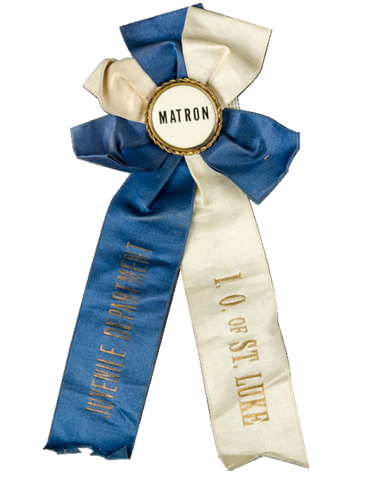From its inception, the Independent Order of St. Luke (IOSL) identified and provided for African American needs. Over three decades, the IOSL grew from a burial society to a fraternal order and life insurance company. It provided a social outlet and security to its members, including the payment of death benefits.
Maggie Walker took charge of the Order in 1899 when the need for economic independence was critical to improving lives of African Americans. She led the Order into the 20th century with the words, “Let us put our money together; let us use our money; Let us put our money out as usury among ourselves, and reap the benefit ourselves." Mrs. Walker’s ability to inspire and organize led to record accomplishments for the IOSL over the next 20 years. These included increased membership, financial security, and business ownership. More...
Marketing
Maggie Walker and the Right Worthy Grand Council, the centralized head council of the Order were responsible for attracting new members. The success of fraternal societies hinged on membership recruitment and their payment of dues. In 1915, the “Every Member Campaign” called for 10,000 new members. The final count of 7,038 new adult members was due to each member recruiting one new member. In addition to membership drives, the IOSL employed a full time field staff whose sole purpose was membership recruitment. These workers received lucrative commission-based salaries and the satisfaction of seeing the steady growth of the Order. Walker and the St. Luke Boosters campaigned to increase membership regularly.
Mrs. Walker was revered as an eloquent speaker. She traveled the East Coast, the South and Midwest, from city to city, promoting the IOSL. In 1924, the Order documented a presence in 24 states with 80,000 adult members and 20,000 youth members. As a co-founder of the Juvenile Department, Walker viewed it as critical to growing the next generation of members and leaders. To bring the mission of the IOSL to more people, Walker founded the St. Luke Herald, a weekly newspaper. It informed readers of IOSL work, and the social, economic, and legal injustices experienced in the black community.
Insurance
White-owned firms denied the black community access to disability and life insurance in the Jim Crow era. As an African American fraternal organization, the IOSL resolved to provide weekly sickness and disability benefits and death claims for members, beginning in 1895. Like modern insurance companies, it offered choices in premiums for children, adults and seniors. By 1897, the IOSL issued 2,276 policies and paid eight death claims. Walker’s successful leadership in membership campaigns grew the treasury allowing prompt payment of death claims and lower costs for premiums. Mrs. Walker’s vision for her growing organization contributed to the development of modern, autonomous African American communities that provided services and needs from business and real estate financing to education, food, and clothing. Her business model also afforded African American women the opportunity to work as professionals and demanded that black men support these roles for their counterparts.










